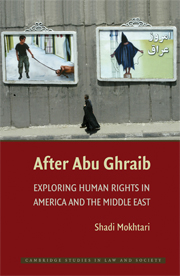Book contents
- Frontmatter
- Contents
- Acknowledgments
- Abbreviations
- Introduction
- ONE American Imaginings of Human Rights and the Middle East
- TWO The Human Rights Challenge from Within
- THREE The Middle Eastern Gaze on American Human Rights Commitments
- FOUR American Imprints and the Middle East's New Human Rights Landscape
- FIVE From the Ashes of the Post–September 11th Era: Lessons for the Human Rights Project
- Conclusion
- Bibliography
- Index
- CAMBRIDGE STUDIES IN LAW AND SOCIETY
- References
FOUR - American Imprints and the Middle East's New Human Rights Landscape
Published online by Cambridge University Press: 12 September 2009
- Frontmatter
- Contents
- Acknowledgments
- Abbreviations
- Introduction
- ONE American Imaginings of Human Rights and the Middle East
- TWO The Human Rights Challenge from Within
- THREE The Middle Eastern Gaze on American Human Rights Commitments
- FOUR American Imprints and the Middle East's New Human Rights Landscape
- FIVE From the Ashes of the Post–September 11th Era: Lessons for the Human Rights Project
- Conclusion
- Bibliography
- Index
- CAMBRIDGE STUDIES IN LAW AND SOCIETY
- References
Summary
In the post–September 11 era, the Middle East stood at the center of American experiments with both the violation and promotion of international human rights norms. This chapter traces how the Middle East's human rights landscape was transformed through the chain of events set in motion by these American experiments. The chapter begins by considering the contradictory effects of American post–September 11th human rights transgressions – the new prism through which the international legal system came to be filtered in the Middle East – on human rights consciousness in the region. The chapter then turns its attention to the American reform agenda, its co-opting by Middle Eastern governments, and its tentative openings for moving the Middle Eastern human rights project forward. The final section highlights transformations emerging from the confluence of both American abuses and promotion initiatives within the realm of religious/secular dynamics in the Middle East's human rights field. By assembling a string of empirical snapshots reflecting Middle Eastern voices and experiences during the era, the chapter draws a picture of the period as characterized by considerable engagement, flux, and transformation – at some junctures regressive or illusory, at others tangible and far-reaching – amid the backdrop of its successive human rights failings.
HUMAN RIGHTS THROUGH THE PRISM OF AMERICAN VIOLATIONS
An immense sense of disillusionment and false promise has pervaded the Middle Eastern encounter with human rights in the post–September 11th era.
- Type
- Chapter
- Information
- After Abu GhraibExploring Human Rights in America and the Middle East, pp. 150 - 199Publisher: Cambridge University PressPrint publication year: 2009



